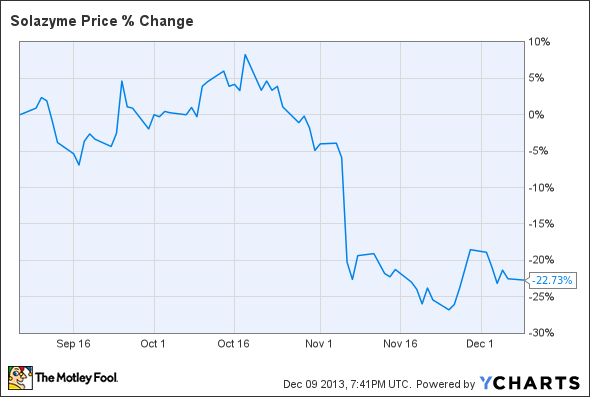Should Investors Expect More Delays at Solazyme in 2014?
Industrial biotech and renewable oils company Solazyme hit investors with some surprising news when it reported third-quarter earnings. Management revised its 2013 guidance for total revenue downward by 25% and announced that its commercial scale facility being built in Moema, Brazil, with sugarcane supplier Bunge would no longer begin operations in the fourth quarter after installing advanced quality control equipment. Instead, the facility will come online during the first quarter along with a commercial scale facility in Clinton, Iowa, being retrofitted with agricultural giant Archer Daniels Midland . The move should reduce risk in the long term for investors, but the market wasn't very happy.
There were several sound reasons for shares to sink. Lower guidance was an obvious candidate, while investors were also reminded about the reality of share dilution now and in the future. But perhaps the biggest reason for caution was the uncertainty associated with production -- and therefore product revenue -- in 2014, which will be heavily aggregated in the second half of the year. Encountering even one setback during ramp up could have a detrimental effect on shares. Should it be a real concern for investors?
Where to focus on scale-up
Investors may be thinking that production will go smoothly in 2014 due to the simple fact that Solazyme has successfully demonstrated that its microbes behave in 500,000 liter fermenters, which will be utilized at Clinton and Moema. That represents a sizable improvement over the 128,000 liter fermenters used to date at its Peoria demonstration facility and an enormous improvement over previous volumes, although the company has yet to prove all production metrics at 500,000 liter scale and still needs to move to 625,000 liter fermenters to achieve its goals.
Additionally, focusing on scale-up in terms of individual tank volumes is a little outdated at this point in development. For instance, consider that moving from 128,000 liter fermenters to 500,000 liter fermenters is a fourfold increase in volume. That's nothing to sneeze at, but if we zoom out and focus on the entire biorefinery, we find that tank volumes mean little without optimized process scheduling.
What the heck is process scheduling? It's the term applied to the utilization and interdependence of all equipment involved in a given process. Engineers must be able to successfully handle and coordinate not just what occurs inside of a fermenter, but also what occurs before nutrients and microbes are added (upstream), what occurs during purification and separation (downstream), how quickly every task is completed, and maintain and clean all of the holding tanks and piping that make it possible. It seems a bit silly to focus on tank volumes when you consider the big picture.
Now, you don't have to be an engineer to see that (partially) proving 500,000 liter fermenters doesn't ensure smooth sailing for 2014. Consider that Solazyme's current facility in Peoria has an annual nameplate capacity of 1,820 metric tons. Moema and Clinton will have annual nameplate capacities of 100,000 MT and 20,000 MT, respectively. That roughly translates to a 55-fold and an 11-fold scale-up in process scheduling -- volumes of nutrients, buffers, cleaning agents, and the like -- respectively. That's a big leap that could lead to any number of potential setbacks and delays.
Not the bogeyman
The leap in process scheduling isn't meant to be the bogeyman for investors. In all fairness, Solazyme has designed the engineering solutions to handle the process scheduling of its commercial scale facilities in Moema and Clinton. Additionally, the company will be easing into commercial operations over the 12- to 18-month ramping period for each facility to work out unforeseen kinks in its process scheduling plans.

Source: Solazyme 3Q13 earnings presentation.
Essentially, downtime is built into ramp-up. That doesn't mean delays won't happen, however. Problems will inevitably occur and it only takes one lingering obstacle to turn scheduled downtime into unscheduled downtime (i.e. a delay). Remember, Moema and Clinton represent the first time Solazyme will gain experience with its platform at commercial scale. There is no blueprint to follow.
Foolish bottom line
There's an old saying among process engineers: "Scale-up is more art than science." That simple and powerful phrase conveys the difficultly and unpredictability of process scale-up. Similar problems encountered at other industrial biotech companies should do the same. So while it's possible that Solazyme cruises through 2014 without any production setbacks, I don't think that's where investors or Wall Street should set the bar. I think it's best to prepare for additional delays.
Is industrial biotech too risky for you?
Depending on your investing style, the industrial biotech industry may represent an enormous opportunity or headache. Either way, opportunities to get wealthy from a single investment don't come around often, but they do exist, and our chief technology officer believes he's found one. In this free report, Jeremy Phillips shares the single company that he believes could transform not only your portfolio, but your entire life. To learn the identity of this stock for free and see why Jeremy is putting more than $100,000 of his own money into it, all you have to do is click here now.
The article Should Investors Expect More Delays at Solazyme in 2014? originally appeared on Fool.com.
Fool contributor Maxx Chatsko has no position in any stocks mentioned. Check out his personal portfolio, his CAPS page, or follow him on Twitter @BlacknGoldFool to keep up with his writing on biopharmaceuticals, industrial biotech, and the bioeconomy.The Motley Fool owns shares of Solazyme. Try any of our Foolish newsletter services free for 30 days. We Fools may not all hold the same opinions, but we all believe that considering a diverse range of insights makes us better investors. The Motley Fool has a disclosure policy.
Copyright © 1995 - 2013 The Motley Fool, LLC. All rights reserved. The Motley Fool has a disclosure policy.


